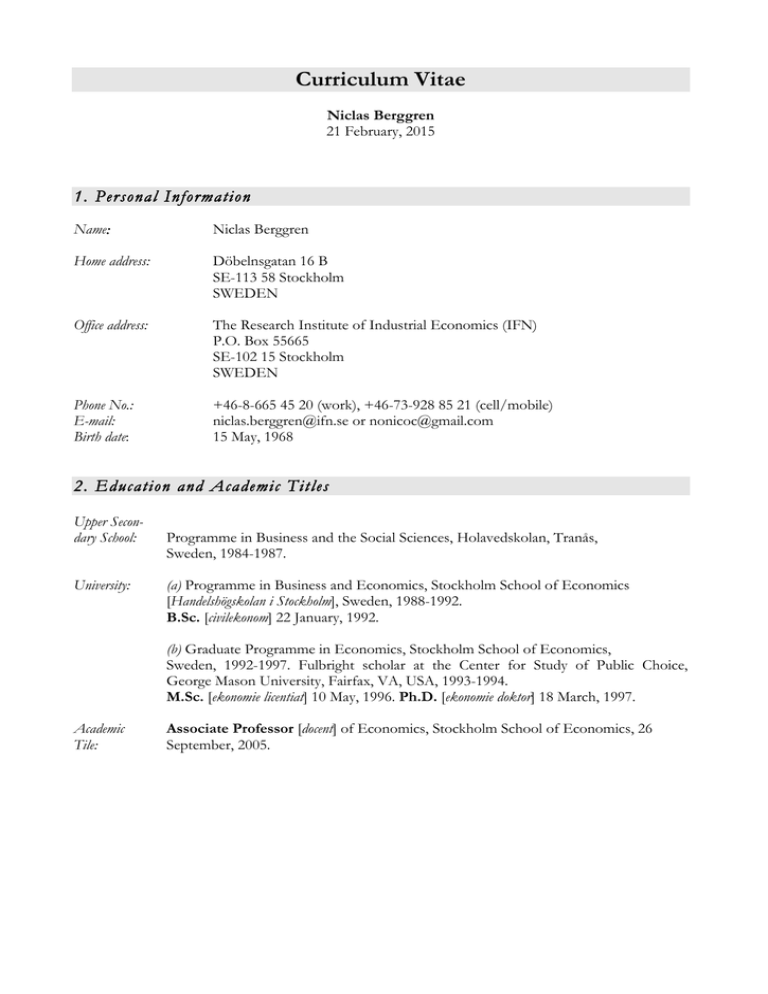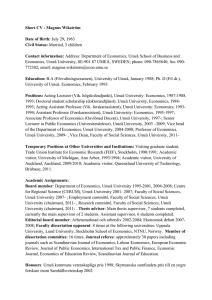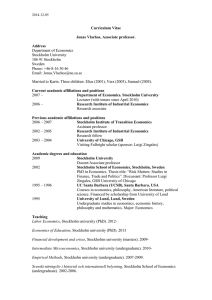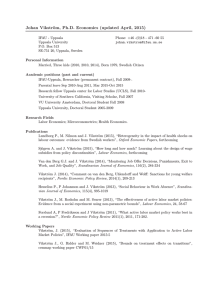
Curriculum Vitae
Niclas Berggren
21 February, 2015
1. Personal Information
Name:
Niclas Berggren
Home address:
Döbelnsgatan 16 B
SE-113 58 Stockholm
SWEDEN
Office address:
The Research Institute of Industrial Economics (IFN)
P.O. Box 55665
SE-102 15 Stockholm
SWEDEN
Phone No.:
E-mail:
Birth date:
+46-8-665 45 20 (work), +46-73-928 85 21 (cell/mobile)
niclas.berggren@ifn.se or nonicoc@gmail.com
15 May, 1968
2. Education and Academic Titles
Upper Secondary School:
University:
Programme in Business and the Social Sciences, Holavedskolan, Tranås,
Sweden, 1984-1987.
(a) Programme in Business and Economics, Stockholm School of Economics
[Handelshögskolan i Stockholm], Sweden, 1988-1992.
B.Sc. [civilekonom] 22 January, 1992.
(b) Graduate Programme in Economics, Stockholm School of Economics,
Sweden, 1992-1997. Fulbright scholar at the Center for Study of Public Choice,
George Mason University, Fairfax, VA, USA, 1993-1994.
M.Sc. [ekonomie licentiat] 10 May, 1996. Ph.D. [ekonomie doktor] 18 March, 1997.
Academic
Tile:
Associate Professor [docent] of Economics, Stockholm School of Economics, 26
September, 2005.
Niclas Berggren: Curriculum Vitae
3. Professional Positions
Assistant:
1992–1997: Graduate student at the Department of Economics, Stockholm School
of Economics; teaching, administrative assistant for various courses (see section 7
below).
Research
positions:
Affiliations:
a) 1997–2002: Fellow at the City University of Stockholm; research in the project
Democracy and Constitutionalism, publication of articles and books, joint administrative
leadership of the just-mentioned research project, director of the constitutional
seminar series, teaching (see section 7 below).
b) 2002–2011: Vice president of and research fellow at the Ratio Institute; including
joint leadership of the institute, research in the projects Institutions for Economic Dynamics
and Growth (2002-2004), Institutional Competition and the Outcomes of Politics (2005-2007),
Market, Morality, Trust and Growth (2005-2007), Institutions, Social Attitudes and Economic
Growth (2010-2013), Property Rights, the Conditions for Enterprise and Economic Growth
(2010-2013), publication of articles and books, administrative leadership of the justmentioned research projects, director of the Ratio research-seminar series.
c) 2011-present: Research fellow at the Research Institute of Industrial Economics
(IFN); research in the projects Institutions, Social Attitudes and Economic Growth (20102013), Property Rights, the Conditions for Enterprise and Economic Growth (2010-2013), the
Economic Importance of Social Attitudes (2013-2015), Conditions for Growth – Institutions and
Social Attitudes in a Global Economy, (2014-2017), Trust, Tolerance and Growth – New
Methods for Finding Causal Relationships (2015-2016); director of the Institute’s researchseminar series; from 2013, program director of IFN’s research program The Economics
of Institutions and Culture.
Department of Institutional, Environmental and Experimental Economics (KIE),
Faculty of Economics, University of Economics in Prague (2012–).
4. Grants
I have been an applicant for and receiver of these grants:
Individual Grants
1. Grants to pursue PhD studies at the Stockholm School of Economics from Finanspolitiska
forskningsinstitutet, 1992-1997.
2. Grant to visit the Center for Study of Public Choice, George Mason University, 1993-1994 from the
Fulbright Commission and from the Stockholm School of Economics.
3. Fellowship from the International Centre for Economic Research and the University of Economics
in Prague to visit, do research and teaching of PhD students during September-December 2011, AprilJune 2013 and April-June 2014.
4. Grant for the research project The Economic Importance of Social Attitudes, from Johan och Jakob
Söderbergs Stiftelse, 2013-2015.
Major Research-Project Grants (where I have been a co-applicant)
1. Democracy and Constitutionalism, from Torsten och Ragnar Söderbergs stiftelser, 1998-2001.
2. Institutions for Economic Dynamics and Growth, from Torsten och Ragnar Söderbergs stiftelser, 2002-2004.
3. Institutional Competition and the Outcomes of Politics. from Torsten och Ragnar Söderbergs stiftelser, 2005-2007.
4. Market, Morality, Trust and Growth, from Stiftelsen Marcus och Amalia Wallenbergs minnesfond, 2005-2007.
5. Institutions, Social Attitudes and Economic Growth, from Vetenskapsrådet, 2010-2012.
2
Niclas Berggren: Curriculum Vitae
6. Property Rights, the Conditions for Enterprise and Economic Growth, from Stiftelsen Marcus och Amalia
Wallenbergs minnesfond, 2010-2012.
7. Conditions for Growth – Institutions and Social Attitudes in a Global Economy, from Vetenskapsrådet, 2014–
2017
8. Trust, Tolerance and Growth – New Methods for Finding Causal Relationships, from Torsten Söderbergs stiftelse,
2015–2016
5. Academic Writings
Dissertation:
Berggren, N. (1997). Essays in Constitutional Economics. Stockholm: The
Economic Research Institute.
Articles in journals with peer review:
Berggren, N. and Nilsson, T. (2015). ”Globalization and the Transmission of Social
Values: The Case of Tolerance.” Journal of Comparative Economics, forthcoming.
Berggren, N., Bjørnskov, C. and Lipka, D. (2015). “Legitimacy and the Cost of
Government.” Public Choice, 162(3-4): 307-328.
Berggren, N., Bergh, A. and Bjørnskov, C. (2015). “What Matters for Growth in
Europe? Institutions versus Policies, Quality versus Instability.” Journal of
Economic Policy Reform, 18(1): 69-88.
Berggren, N. and Nilsson, T. (2014). “Market Institutions Bring Tolerance, Especially
Where There Is Social Trust.” Applied Economics Letters, 21(17): 1234-1237.
Berggren, N., Daunfeldt, S.-O. and Hellström, J. (2014). “Social Trust and CentralBank Independence.” European Journal of Political Economy, 34(June): 425-439.
Berggren, N. (2014). “Ekonomins grund i kultur och institutioner.” [“The Economy’s
Cultural and Institutional Roots.”] Ekonomiska Samfundets Tidskrift, 67(1): 6–15.
Berggren, N. (2014). “The Calculus of Consent at Fifty: Insights for Liberalism.”
Independent Review, 18(3): 373-389.
Berggren, N. and Bjørnskov, C. (2013). “Does Religiosity Promote Property Rights
and the Rule of Law?” Journal of Institutional Economics, 9(2): 161-185.
Berggren, N. and Nilsson, T. (2013). “Does Economic Freedom Foster Tolerance?”
Kyklos, 66(2): 177-207.
Berggren, N. and Elinder, M. (2012). “Tolerance and Growth: Modeling the
Empirical Relationship.” Public Choice, 153(3-4): 495-502.
Berggren, N. (2012). “The Calculus of Consent: Some Swedish Connections.” Public Choice,
152(3-4): 313-321.
Berggren, N. and Elinder, M. (2012). “Is Tolerance Good or Bad for Growth?” Public
Choice, 150(1–2): 283–308.
Berggren, N., Bergh, A. and Bjørnskov, C. (2012). “The Growth Effects of
Institutional Instability.” Journal of Institutional Economics, 8(2): 187-224.
Berggren, N. (2012). “Time for Behavioral Political Economy? An Analysis of
Articles in Behavioral Economics.” Review of Austrian Economics, 25(3): 199-221.
Berggren, N. and Bjørnskov, C. (2011). “Is the Importance of Religion in Daily Life
Related to Social Trust? Cross-Country and Cross-State Comparisons.” Journal
of Economic Behavior & Organization, 80(3): 459–480.
Berggren, N., Jordahl, H. and Poutvaara, P. (2010). “The Looks of a Winner: Beauty
and Electoral Success.” Journal of Public Economics, 94(1–2): 8–15.
Berggren, N., Jordahl, H. and Stern, C. (2009). “The Political Opinions of Swedish
Social Scientists.” Finnish Economic Papers, 22(2): 75–88.
Poutvaara, P., Jordahl, H. och Berggren, N. (2009). ”Faces of Politicians:
Babyfacedness Predicts Inferred Competence but Not Electoral Success.”
Journal of Experimental Social Psychology, 45(5): 1132–1135.
3
Niclas Berggren: Curriculum Vitae
Berggren, N. (2009). “Choosing One's Own Informal Institutions: On Hayek's
Critique of Keynes's Immoralism.” Constitutional Political Economy, 20(2): 139159.
Berggren, N., Elinder, M. and Jordahl, H. (2008). “Trust and Growth: A Shaky
Relationship.“ Empirical Economics, 35(2): 251–274.
Berggren, N. (2006). “Legal Positivism and Property Rights: A Critique of Hayek and
Peczenik.” Constitutional Political Economy, 17(3): 217-235.
Berggren, N. and Jordahl, H. (2006). ”Free to Trust: Economic Freedom and
Social Capital.” Kyklos, 59(2): 141-169.
Berggren, N. and Jordahl, H. (2005). ”Does Free Trade Really Reduce Growth?
Further Testing Using the Economic Freedom Index.” Public Choice,
122 (1-2): 99-114.
Berggren, N. (2004). “Does Ethical Subjectivism Pose a Challenge to Classical
Liberalism?” Reason Papers, 27(Fall): 69-86.
Kurrild-Klitgaard, P. and Berggren, N. (2003). ”Economic Consequences of
Constitutions: A Theory and Survey." Journal des Économistes et des Études
Humaines, 14(1): 3-42.
Berggren, N. (2003). “The Benefits of Economic Freedom: A Survey.” The
Independent Review, 8(2), 193-211.
Berggren, N. and Karlson, N. (2003). ”Constitutionalism, Division of Power, and
Transaction Costs.” Public Choice, 117(1-2): 99-124.
Berggren, N. (2000). "Implementing Generality while Reducing the Risk for
Fiscal Explosion." Constitutional Political Economy, 11(4): 353-369.
Berggren, N. (1999). ”A Preference-Utilitarian Foundation for the Generality
Principle.” Constitutional Political Economy, 10(4): 339-353.
Berggren, N. (1999). ”Economic Freedom and Equality: Friends or Foes?” Public
Choice, 100(3-4): 203-223.
Berggren, N. (1997). ”Rhetoric or Reality? An Economic Analysis of the Effects
of Religion in Sweden.” Journal of Socio-Economics, 26(6): 571-596.
Berggren, N. (1996). ”Social Order through Constitutional Choice: A
Contractarian Proposal.” Public Choice, 89(3-4): 339-361.
Articles in journals without peer review:
Berggren, N. (2014). “The Soft Side of Economic Freedom.” The Annual Proceedings of
the Wealth and Well-Being of Nations, 6: 43-66.
Berggren, N. and Nilsson, T. (2014). ”Sex reflexioner om ojämlikhet” [“Six Reflections
on Inequality”]. Ekonomisk Debatt, 42(7): 3–5.
Berggren, N. and Nilsson, T. (2014). ”Nationalekonomers politiska relevans” [“The
Political Relevance of Economists”]. Ekonomisk Debatt, 42(4): 3–5.
Berggren, N. (2014). “Militärtjänstgöring under tvång eller frivillighet?” [“Mandatory
or Voluntary Military Service?”] Ekonomisk Debatt, 42(3): 89-90.
Berggren, N. and Nilsson, T. (2014). “Påvens ekonomiska snedsteg” [“The Economic
Error of the Pope”] Ekonomisk Debatt, 42(1): 3-4.
Berggren, N. (2013). “Värnpliktens kostnader” [“The Costs of Conscription”]
Ekonomisk Debatt, 41(8): 3-4.
Berggren, N. (2013). “James M. Buchanan Jr.” Econ Journal Watch, 10(3): 292–299.
Berggren, N. (2013). “Bertil Ohlin.” Econ Journal Watch, 10(3): 532–536.
Berggren, N. and Nilsson, T. (2013). “Lärdomar av en jubilar” [“Things to Learn from
a Committee Celebrating Its Anniversary”] Ekonomisk Debatt, 41(4): 3-4.
Berggren, N. (2013). “Den bortglömda generaliteten” [“Generality Forgotten”]
Ekonomisk Debatt, 41(1): 3-4.
Berggren, N. and Bergh, A. (2012). “Ingen samsyn om konkurrensens konsekvenser”
4
Niclas Berggren: Curriculum Vitae
[“No Consensus about the Consequences of Competition”] Ekonomisk Debatt,
40(4): 3-4.
Berggren, N. (2012). “Ska akademiker bekänna ideologisk färg?” [“Should Academics
Confess Their Ideology?”] Ekonomisk Debatt, 40(2): 3-4.
Berggren, N. and Bergh, A. (2012). “Faran med styrd forskning” [“The Danger of
Research Being Influenced by Financers”] Ekonomisk Debatt, 40(1): 3-5.
Berggren, N. (2011). “Utred betalning för organdonation” [“Time for a Government
Commission to Look at Payment for Organ Donation”] Ekonomisk Debatt,
39(6): 3-4.
Berggren, N. (2011). “Dags för beteendepolitisk ekonomi?” [“Time for Behavioral
Political Economy?”] Ekonomisk Debatt, 39(3): 3-4.
Berggren, N., Jordahl, H. and Stern, C. (2011). “Var står svenska samhällsvetare
politiskt?” [“Where Do Swedish Social Scientists Stand Politically?”].
Ekonomisk Debatt, 39(1): 21-28.
Berggren, N. and Karlson, N. (2006).“Konstitutionell ekonomi - lärdomar för
Grundlagsutredningen” [“Constitutional Economics - Insights for the
Committee on the Constitution”]. Ekonomisk Debatt, 34(7): 44–56.
Berggren, N. and Jordahl, H. (2006). ”Tillitens ekonomi” [”The Economics of
Trust”]. Ekonomisk Debatt, 34(3): 41–54.
Berggren, N. (2003). “Ekonomisk frihet, tillväxt och jämlikthet” [“Economic
Freedom, Growth, and Equality”]. Ekonomisk Debatt, 31(3): 47–58.
Book chapters
and books:
Berggren, N. (2014). “Institutionernas ekonomi – betydelsen av lagar, moral och
attityder” [“The Economics of Institutions: The Role of Laws, Morals and
Attitudes”]. In Henrekson, M. and Albinsson Bruhner, G. (Eds) IFN 1939–
2014 – 75 år av ekonomisk forskning [IFN 1939–2014: 75 Years of Economic
Research]. Stockholm: Ekerlids Förlag.
Berggren, N. (2013). “James Buchanan – en konstitutionell, politisk och frihetlig
ekonom” [“James Buchanan: A Constitutional, Political and FreedomOriented Economist”]. In Berggren, N. (Ed.) (2013).
Berggren, N. (Ed.) (2013). Konstitutioner, politik och frihet – James Buchanan i urval
[Constitutions, Politics and Freedom: Selected Works by James Buchanan]. Stockholm:
Timbro.
Berggren, N. (Ed.) (2008). Marknad och moral: en antologi [Markets and Morality: An
Anthology]. Stockholm: Ratio.
Berggren, N. and Erlingsson, G. Ó. (2008). ”Förändras demokratin av institutionell
konkurrens?” [”Does Democracy Change as a Result of Institutional
Competition”]. In Karlson, N. (Ed) Sverige i den institutionella konkurrensen
[Sweden in the Institutional Competition]. Report No. 4 to the Globalization
Council. Stockholm: The Globalization Council.
Berggren, N. (2005). “Rättspositivism och äganderätt.” [“Legal Positivism and
Property Rights.”] In Berggren, N. and Karlson, N. (2005).
Berggren, N. and Karlson, N. (Eds.) (2005). Äganderättens konsekvenser och grunder.
[The Consequences and Foundations of Property Rights.] Stockholm: Ratio.
Berggren, N. (2001). ”Fiskal illusion och en konstitutionell princip för
transparens” [”Fiscal Illusion and a Constitutional Principle for
Transparency”]. In Berggren, N., Karlson, N. and Nergelius, J. (2001).
Berggren, N., Karlson, N. and Nergelius, J. (2001). Den konstitutionella
revolutionen [The Constitutional Revolution]. Stockholm: City University
Press.
Berggren, N., Karlson, N. and Nergelius, J. (Eds.) (2001). Demokratins
konstitutionella val [Democracy’s Constitutional Choice]. Stockholm: City
5
Niclas Berggren: Curriculum Vitae
University Press.
Berggren, N. (2000). ”Public Choice.” In Norberg, J. (Ed.) Stat, individ och
marknad: sex skolor i samtida samhällsfilosofi [State, Individual, and Market:
Six Schools in Contemporary Social Philosophy]. Stockholm: Timbro.
Berggren, N. and Kurrild-Klitgaard, P. (2000). ”Economic Effects of Political
Institutions, with Special Reference to Constitutions.” In Berggren, N.,
Karlson, N. and Nergelius, J. (2000).
Berggren, N., Karlson, N. and Nergelius, J. (Eds.) (2000). Why Constitutions
Matter. Stockholm: City University Press. Published in an American
edition in 2002 by Transaction Publishers.
Berggren, N. and Bergström, F. (1999). ”A Constitutional Analysis of Selectivity
in Economic Policy Making.” In Berggren, N., Karlson, N. and Nergelius,
J. (1999).
Berggren, N., Karlson, N. and Nergelius, J. (Eds.) (1999). Makt utan motvikt: om
demokrati och konstitutionalism [Power without Counterbalance: On
Democracy and Constitutionalism]. Stockholm: City University Press.
Book reviews:
Work in
progress:
Berggren, N. (2004). Review of Niskanen, W. (2003). Autocratic, Democratic, and
Optimal Government: Fiscal Choices and Economic Outcomes. Cheltenham:
Edward Elgar. Economic Affairs, 24(3): 81-82.
Berggren, N. (2001). Review of Moser, P. (2000). The Political Economy of
Democratic Institutions. Cheltenham: Edward Elgar. Constitutional
Political Economy, 12(3): 273-275.
Berggren, N. (1999). Review of Buchanan, J. M. and Congleton, R. D. (1998).
Politics by Principle, Not Interest: Towards Nondiscriminatory Democracy.
Cambridge: Cambridge University Press. Statsvetenskaplig Tidskrift,
102(2): 233-237.
Berggren, N., Jordahl, H. and Poutvaara, P. “The Right Look: Conservative Politicians
Look Better and Their Voters Reward It.” IFN WP No. 855, 2010.
Berggren, N., Daunfeldt, S-O and Hellström, J. “Social Trust and Central-Bank
Independence.”
6. Popular Publications
Policy Analyses: I have written or contributed to writing ten policy analyses in Swedish. Six
examples:
1. In 1993 I assisted Professor Hans Tson Söderström in his policy research for the Bank of Finland
concerning the economic problems of the country and the way out.
2. In 1997 I functioned as an associate in the writing of a report on budget consolidation in the
Nordic countries under the Nordic Ministers of Finance.
3. In 1999 I wrote a report on the connection between constitutional arrangements and economic
development for the Moderate Party (co-author: Fredrik Bergström).
4. In 2005, I wrote a chapter for conference proceedings from for the Parliamentary Constitutional
Commission, based on a presentation at their research conference (co-author: Nils Karlson).
5. In 2006, I wrote a report on the economic effects of constitutions for the Confederation of Swedish
Enterprise (co-author: Nils Karlson).
6. In 2013, I wrote a report on “Institutions, Policies and Growth in Europe: Quality versus Stability”
for the Swedish Institute for European Policy Studies (SIEPS; report 2013:4) (co-authors: Andreas
Bergh and Christian Bjørnskov).
6
Niclas Berggren: Curriculum Vitae
Research-Related Publications: I have published many articles in magazines and newspapers in
Swedish, presenting research results in a popular way, and these are also available upon request. Seven
examples:
1. “Regeringen förvärrar orättvisorna” [”The Government Worsens Injustices”], Dagens Nyheter, 9
May, 2001 (co-authors: Fredrik Bergström and F. Mikael Sandström).
2. “Etik sköts bäst av marknadsekonomin” [“Ethics Is Best Handled by the Market Economy”],
Dagens Industri, 3 March, 2006 (co-auhtor: Henrik Jordahl).
3. “Forskning: sänkt skatt ger fler jobb” ["Research: Lower Taxes Give More Jobs"], Sydsvenskan, 2
September, 2006 (co-authors: Andreas Bergh and Henrik Jordahl).
4. “Tre ministrar som får fyra tuffa år” [“Three Minister Who Have Four Tough Years”], Dagens
Industri, 7 October, 2006 (co-author: Andreas Bergh).
5. “Riskkapitalister är central” [“Venture Capitalists Are Central”]. Enköpings-Posten, 2 June, 2010.
6. “Socialministern bör lyssna på Roth” [“The Minister of Social Affairs Should Listen to Roth”],
Svenska Dagbladet, 10 December, 2012.
7. “Politik utan romantik” [“Politics without Romance”], Svenska Dagbladet, 15 December, 2013.
Blogging: I blogged from 2007–2011 at http://nonicoclolasos.wordpress.com on a daily basis, often
presenting new research findings. I still have about 500 visits per day, making it, I believe, one of the
largest “academic” blogs in Sweden.
7. Additional Experience
Editorial Position
Member of the editorial board of Ekonomisk Debatt (the journal of the Swedish Economics
Assocation), 2011. Co-editor of this journal, 2012–2015.
Teaching and Course Administration
1. During the academic year 1992-1993 I was a teaching instructor in the course Macroeconomic
Theory and Stabilization Policy (Course Director: Associate Professor Anders Vredin), and I
administered the course Economic-Policy Analysis (Course Director: Adjunct Professor Hans Tson
Söderström) - in both cases at the Stockholm School of Economics.
2. During 1998-2001 I taught and arranged the course Market Processes at the City University of
Stockholm.
3. During 2000-2001, I was one of the teachers in the course The Power and Institutions of Politics at
the City University of Stockholm.
5. During 2009-2010, I was one of the teachers in the course The Power and Institutions of Politics,
given to a select group at the Confederation of Swedish Enterprise.
6. During 2011, I taught a PhD course, “The Economics of Institutional Change”, at the Faculty of
Economics, University of Economics, in Prague, the Czech Republic.
7. During 2013, I gave a four-session PhD seminar, “The Economics and Philosophy of James
Buchanan”, at the Faculty of Economics, University of Economics, in Prague, the Czech Republic.
8. During 2014, I gave 6x90 sessions in the Master’s-level course “Theory of Social Systems”, at the
Faculty of Economics, University of Economics, in Prague, the Czech Republic.
Conferences
Scientific conferences with paper presentation:
- European Public Choice Society, Gothenburg, 1998
- International Joseph A. Schumpeter Society, Vienna, 1998
- Public Choice Society, New Orleans, 1999
7
Niclas Berggren: Curriculum Vitae
- European Public Choice Society, Lisbon, 1999
- European Public Choice Society, Siena, 2000
- European Public Choice Society, Paris, 2001
- Public Choice Society, San Diego, 2002
- Public Choice Society, Nashville, 2003
- Public Choice Society, Baltimore, 2004
- European Public Choice Society, Berlin, 2004
- Public Choice Society, New Orleans, 2005
- European Public Choice Society, Durham, 2005
- Public Choice Society, New Orleans, 2006
- World Meeting of the Public Choice Societies, Amsterdam, 2007
- Public Choice Society, San Antonio, 2008
-Public Choice Society, Las Vegas, 2009
-Helsinki Center of Economic Research, Conference on Political Economy, Helsinki, 2009
-Ersta Sköndal University College conference “The Social Dimensions of Religion in Civil
Society”, Stockholm, 2009
-Public Choice Society, Monterey, 2010
-University of Turku conference “Philosophy, Politics and Economics
of Public Choice: Reflections on Geoffrey Brennan's Contributions”, Turku, 2010
-National Conference of Swedish Economists, Lund, 2010
-Public Choice Society, San Antonio, 2011
-European Public Choice Society, Rennes, 2011
-Southern Economic Association, Washington, DC, 2011
-World Meeting of the Public Choice Societies, Miami, 2012
-Midwestern Political Science Association, Chicago, 2012
-Southern Economic Association, New Orleans, 2012
-Public Choice Society, New Orleans, 2013
-Australasian Public Choice Society, Singapore, 2013
-Public Choice Society, Charleston, 2014
-World Interdisciplinary Network for Institutional Research, London, 2014
-Allied Social Science Associations, Boston, 2015
- Public Choice Society, San Antonio, 2015
Organized Liberty Fund conferences:
- “Liberty and Constitutional Choice”, Stockholm, 2002 (co-director)
- “Liberty and Property Rights”, Stockholm, 2003 (co-director)
- “Liberty and Entrepreneurship”, Stockholm, 2004 (co-director, discussion leader)
- “The Limits of Rationality”, Stockholm, 2006 (co-director)
- “Liberty in the Works of James Buchanan”, Stockholm, 2007 (co-director)
- “Ideas and Interests in Institutional Change”, Stockholm, 2008 (co-director)
- “Liberty in the Works of MPS Nobel Laureates”, Stockholm, 2009 (co-director)
-“Liberty and the Challenges of Neutrality”, Stockholm, 2010 (co-director)
-“The Legacy of Gordon Tullock”, Stockholm, 2011 (co-director)
-“Liberty, Immigration, and Community”, Stockholm, 2013 (co-director)
- “Liberty and Bioethics”, Stockholm, 2014 (co-director)
Other:
- Research conference by the Working Committee on Constitutional Reform
[Grundlagsutredningen], Stockholm, 2005 (giving a talk on reasearch in constitutional economics)
- Co-director of the research conference "Trust, Reciprocity and Social Capital: The 2006
Ratio Colloquium for Young Social Scientists", Stockholm, 2006
- Co-director of the Mont Pelerin Society Conference “The Market Economy in the Welfare
State”, Stockholm, 2009
- Co-director of the research conference “Property Rights, the Conditions for Enterprise and
Economic Growth”, Stockholm 2011
8
Niclas Berggren: Curriculum Vitae
- Paper presenter of “The Calculus of Consent at 50” at the Mont Pelerin Society Conference,
Prague, 2012
Referee
Referee work has been undertaken twelve times for Public Choice, seven times for Constitutional Political
Economy, ten times for the European Journal of Political Economy, once for American Political Science Review,
once for the Journal of Law and Economics, thrice for Econ Journal Watch, once for Economic Inquiry, once
for Theory and Decision, once for European Journal of Law and Economics, once for The Independent Review: A
Journal of Political Economy, once for the Journal of Economic Growth, once for the Scandinavian Journal of
Economics, four times for the Journal of Institutional Economics, once for Review of Austrian Economics, once
for Kyklos, once for Journal of Evolutionary Economics, once for European Journal of Comparative Economics
and once for Homo Oeconomicus.
In addition, a manuscript on the relationship between health and economic growth in Swedish
counties from the Swedish National Institute of Public Health has been reviewed, 22 March, 2011.
Supervision
Supervision of the master’s student Jesper Fagerberg, writing his thesis at the Department of
Economics, Stockholm School of Economics in 2000, on the theme “Public choice och den statliga
budgetprocessen - en analys av införandet av de statliga budgetrestriktionerna” [“Public Choice and
the Public-Sector Budget Process: An Analysis of the Implementation of the Budget Restrictions on
Government Spending”].
Pre-Defense Dissertation Discussant
i) Discussant of the Ph.D. dissertation manuscript Dynamics and Growth: The Swedish Health-Care Industry
by Ann-Charlotte Fridh, Department of Industrial Economics and Management, Royal Institute of
Technology, pre-defense seminar, 20 September, 2002. ii) Evaluator of the Ph.D. dissertation
manuscript Religion and Post-Communist Transition by Pavol Minárik, Department of Institutional
Economics, University of Economics in Prague, pre-defense seminar, 12 November, 2012.
Grade Committee
i) Member of the Grade Committee for Ph.D. candidate Susanna Lundström, Department of
Economics, Gothenburg University, in connection with the defence of her Ph.D. thesis On Institutions,
Economic Growth and the Environment, 5 March, 2003. ii) Member of the Grade Committee for Ph.D.
candidate Gustav Hansson, Department of Economics, Gothenburg University, in connection with
the defence of his Ph.D. thesis Essays on Social Distance, Institutions, and Economic Growth, 26 September,
2008. iii) Member of the Grade Committee for Ph.D. candidate Casper Hunnerup Dahl, Department
of Political Science, University of Copenhagen, in connection with the defence of his Ph.D. thesis The
Uncertain Effects of Constitutions: Investigating Cross-National Patterns in Rent Seeking and Government Spending,
20 January, 2012. iv) Member of the Grade Committee for Ph.D. candidate Martin Rode, Department
of Economics, University of Cantabria, in connection with the defence of his Ph.D. thesis Economic
Freedom, Growth, Democracy, and Social Welfare: Contributions to the Study of Their Relationship, 4 December
2012. v) Member of the Grade Committee for Ph.D. candidate Oscar Erixson, Department of
Economics, Uppsala University, in connection with the defence of his Ph.D. thesis Economic Decisions
and Social Norms in Life and Death Situations, 16 December, 2013.
Prize
I received a Templeton Freedom Award (2nd prize) with Henrik Jordahl from the Atlas Economic
Research Foundation for the article “Free to Trust: Economic Freedom and Social Capital”, published
in Kyklos, 24 April, 2007.
9



